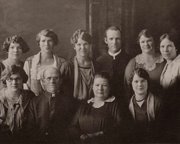The New York Times: US should recognize all Kurds as allies
In an opinion piece by Aliza Marcus and Andrew Apostolou in The New York Times from August 18, 2014, the authors assert that President Obama should "rethink America's policy toward Kurdish nationalism, and recognize the Kurds, and not only Iraqi ones, are his main ally against ISIS."
Marcus and Apostolou claim the current borders are obsolete, and that Kurds from not only Iraq's Kurdistan region are engaged in the fight against the Islamic State insurgents, but also Kurds from Syria and Turkey. Alone, the Iraqi Kurds will be unable to deliver a victory, but by providing assistance also to Syrian and Turkish Kurds in their fight against ISIS, victory over the radical Islamic militants may be much more attainable.
READ MORE HERE...
Jeremiah foresaw the rise of the "spirit of the kings of the Medes" and the formation of a horde of great peoples into a "nation of the north" capable of "draw(ing) up battle lines" against the land of Babylon, engaging it in war, defeating its armies and plundering its treasures.
The Medes are known today as the Kurds of Kurdistan. Jeremiah saw three regions of Medes joining into this new nation: "Ararat, Minni and Askenaz." Minni and Ashkenaz would be better translated as the Mannaeans and the Adiabenes, references to the lands of the ancient tribes preceding and overrun by the Medes. These ancient tribes lived in and ruled over what is now westernmost Iran south of Lake Urmia, with a capital at Izirtu (Zirta), and northeasternmost Iraq, or Upper Mesopotamia, with a capital in Arbil (Erbil), areas now inhabited primarily by Kurds.
Iranian and Iraqi Kurds had until just two decades ago been at odds with each other, even engaged in tribal warfare. That changed with Saddam Hussein's campaign of terror and genocide on the Kurds, precipitating the two factions joining forces and political strategies to resist the dictator's attacks. The two have since joined to co-rule the democratically-inclined and capitalistic-leaning Kurdistan Regional Government, a semi-autonomous region in northern Iraq, that may soon declare its independence from the Iraqi central government.
Ararat refers to the region of eastern Turkey and northeastern Syria, where the Kurds have been led by a completely different political force, will and goal from their eastern brethren. Many of these Kurds align with the political and insurrectionist leanings of the Marxist Kurd rebel Abdullah Ocalan, now a prisoner of Turkey.
With the conflict raging today, the threat of the Islamic State militants spread across Syria and into Iraq, the "Ararat" Kurds may find themselves thrust into circumstances where they cannot avoid joining in some sort of alliance with the "Minni" and "Ashkenaz" -- the Iranian and Iraqi -- Kurds.
If this alliance coalesces, the fulfillment of the prophecy of Jeremiah that these three nations will join into a "great nation" of the north will have occurred, and the stage set for an Iraqi-Median war in which the Medes defeat and plunder the land of Babylon in a God-decreed judgment.
Marcus and Apostolou claim the current borders are obsolete, and that Kurds from not only Iraq's Kurdistan region are engaged in the fight against the Islamic State insurgents, but also Kurds from Syria and Turkey. Alone, the Iraqi Kurds will be unable to deliver a victory, but by providing assistance also to Syrian and Turkish Kurds in their fight against ISIS, victory over the radical Islamic militants may be much more attainable.
READ MORE HERE...
Jeremiah foresaw the rise of the "spirit of the kings of the Medes" and the formation of a horde of great peoples into a "nation of the north" capable of "draw(ing) up battle lines" against the land of Babylon, engaging it in war, defeating its armies and plundering its treasures.
The Medes are known today as the Kurds of Kurdistan. Jeremiah saw three regions of Medes joining into this new nation: "Ararat, Minni and Askenaz." Minni and Ashkenaz would be better translated as the Mannaeans and the Adiabenes, references to the lands of the ancient tribes preceding and overrun by the Medes. These ancient tribes lived in and ruled over what is now westernmost Iran south of Lake Urmia, with a capital at Izirtu (Zirta), and northeasternmost Iraq, or Upper Mesopotamia, with a capital in Arbil (Erbil), areas now inhabited primarily by Kurds.
Iranian and Iraqi Kurds had until just two decades ago been at odds with each other, even engaged in tribal warfare. That changed with Saddam Hussein's campaign of terror and genocide on the Kurds, precipitating the two factions joining forces and political strategies to resist the dictator's attacks. The two have since joined to co-rule the democratically-inclined and capitalistic-leaning Kurdistan Regional Government, a semi-autonomous region in northern Iraq, that may soon declare its independence from the Iraqi central government.
Ararat refers to the region of eastern Turkey and northeastern Syria, where the Kurds have been led by a completely different political force, will and goal from their eastern brethren. Many of these Kurds align with the political and insurrectionist leanings of the Marxist Kurd rebel Abdullah Ocalan, now a prisoner of Turkey.
With the conflict raging today, the threat of the Islamic State militants spread across Syria and into Iraq, the "Ararat" Kurds may find themselves thrust into circumstances where they cannot avoid joining in some sort of alliance with the "Minni" and "Ashkenaz" -- the Iranian and Iraqi -- Kurds.
If this alliance coalesces, the fulfillment of the prophecy of Jeremiah that these three nations will join into a "great nation" of the north will have occurred, and the stage set for an Iraqi-Median war in which the Medes defeat and plunder the land of Babylon in a God-decreed judgment.
Labels: Judgment 6 - Civil War, Kings of the Medes



0 Comments:
Post a Comment
Subscribe to Post Comments [Atom]
<< Home